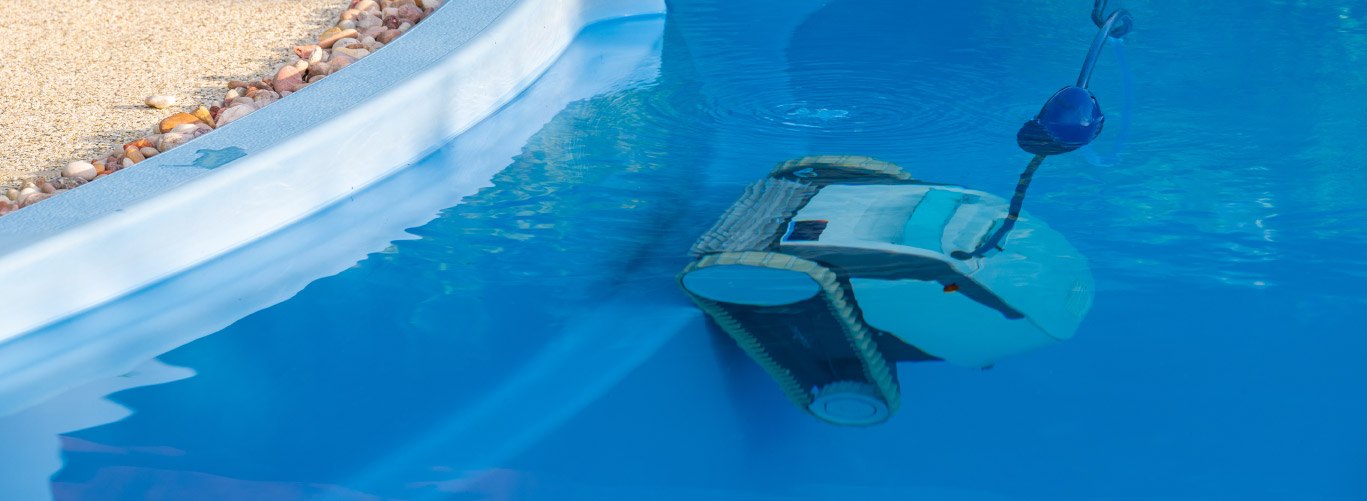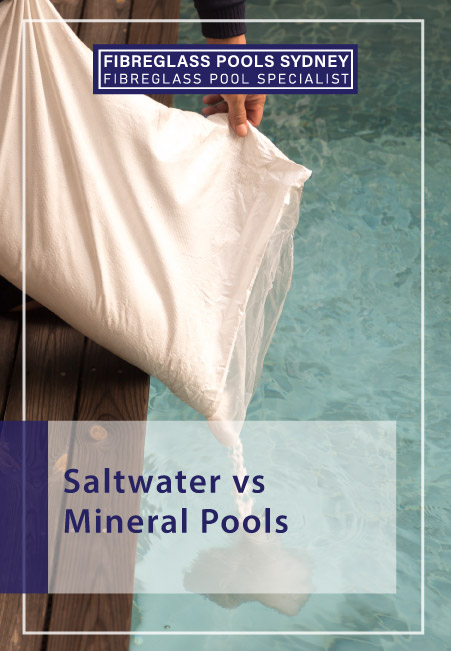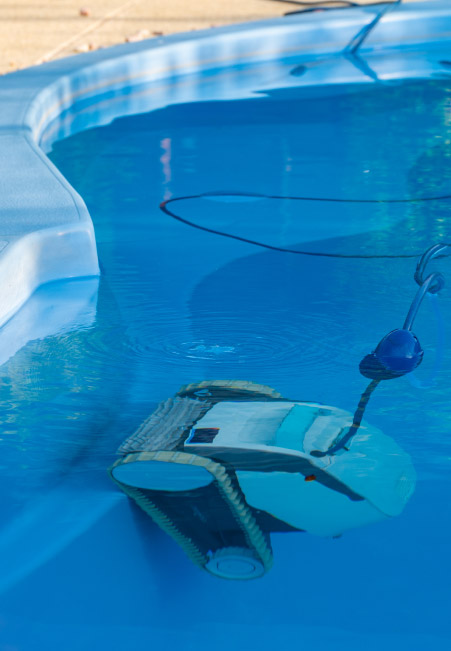Saltwater vs Mineral Pools
Swimming pools have long been a sought-after feature in homes and recreational facilities, providing a refreshing escape from the summer heat. While traditional chlorine pools have been the go-to choice for many, today we have a wider array of options to suit different preferences and needs. Two popular alternatives gaining traction are saltwater pools, known for their gentle and natural feel, and mineral pools, which harness the power of minerals for a rejuvenating swimming experience. These alternatives offer a refreshing and environmentally friendly approach to pool maintenance, ensuring a delightful and enjoyable time for swimmers of all ages.

Examining the Key Differences
Whether you prefer the serene and calming sensation of saltwater or the revitalising and rejuvenating benefits of minerals, you can rest assured that there is a wide array of pool options available, each tailored to meet your unique preferences and needs. With a multitude of designs, sizes, and features, you’ll be able to find the perfect pool that provides the ultimate relaxation and enjoyment for you and your loved ones. So dive in and discover the extraordinary world of pool options that await you!
Saltwater Pools
Contrary to popular belief, saltwater pools do contain chlorine, but the way it is introduced makes a key difference. Instead of directly adding chlorine, saltwater pools utilise a chlorinator, which converts salt into chlorine through a process called electrolysis. This sustainable and efficient method ensures a continuous supply of chlorine, resulting in a more pleasant swimming experience with reduced chemical odour and skin irritation. Additionally, the chlorinator also helps to maintain the pH balance of the water, creating a healthier and more comfortable environment for swimmers.
Advantages of Saltwater Pools
First and foremost, saltwater pools offer a multitude of benefits that make them a preferred choice for swimmers with sensitive skin. The gentle and soothing nature of saltwater is incredibly kind to the skin and eyes, providing a more enjoyable swimming experience overall.
Additionally, the maintenance requirements for saltwater pools are significantly reduced compared to traditional chlorine pools. With a salt cell that generates chlorine as needed, there’s no need to constantly monitor and manually add chlorine to the pool. This not only saves time and effort but also ensures a consistent and optimal chlorine level.
Lastly, while the upfront cost of installing a saltwater system may be higher, the ongoing costs are considerably lower. Say goodbye to regular chlorine purchases, as the saltwater system eliminates this need. This cost-saving aspect, combined with the other advantages, makes saltwater pools an excellent long-term investment for any pool owner.

Disadvantages of Saltwater Pools
The upfront costs of installing a saltwater system can be quite prohibitive, as it involves specialised equipment and professional installation. Additionally, while the saltwater provides a more natural swimming experience, it is important to consider the potential long-term effects on certain types of pool equipment and decking materials.
Over time, the salt in the water can gradually cause corrosion or degradation if not properly maintained. Furthermore, it is worth noting that in the event of a breakdown or malfunction of the pool’s chlorine generator, the cost of repair or replacement can be significant. It is therefore crucial to weigh the benefits and drawbacks before deciding on a saltwater system for your pool.
Mineral Pools
Mineral pools are designed to provide an exceptional swimming experience by utilising a meticulously crafted blend of minerals, predominantly magnesium and potassium, to ensure the water maintains its pristine quality. These carefully selected minerals work harmoniously together, not only to keep the water clean and clear but also to contribute to a truly rejuvenating and therapeutic environment. By incorporating the natural goodness of these minerals, mineral pools offer a unique and highly beneficial way to enjoy a refreshing swim that nourishes both the body and the mind.
Advantages of Mineral Pools
Mineral pools are renowned for their luxurious, velvety water that provides a delightful bathing experience akin to immersing oneself in the purest natural springs. Moreover, the abundant minerals present in the water offer a plethora of therapeutic advantages, effectively soothing various skin conditions and promoting overall well-being. In addition to these remarkable qualities, mineral pools also boast the added advantage of being gentler on the eyes compared to conventional chlorine pools, ensuring a truly rejuvenating and wholesome aquatic indulgence.

Disadvantages of Mineral Pools
One of the main drawbacks of mineral pools is that they often require higher levels of maintenance compared to saltwater pools. This is because mineral pools rely on specific minerals and chemicals to keep the water clean and clear. While they do require a small amount of chlorine to effectively kill bacteria and algae, the overall maintenance can be more involved. From regularly testing and balancing mineral levels to ensuring proper filtration and circulation, the upkeep of a mineral pool can be more time-consuming and costly than that of a saltwater pool.
Summing Up
The choice between a saltwater and mineral pool depends on your personal preferences and circumstances. If you prefer lower maintenance and cost over time, a saltwater pool may be a better choice. However, if you value the silky feel of water and potential therapeutic benefits, a mineral pool might be worth considering, despite the potentially higher maintenance costs.
While the initial investment might be substantial, either type of pool can provide a healthier, more natural swimming experience compared to traditional chlorine pools. To make an informed decision, consider consulting with a pool professional to discuss the specifics of your situation.
If you’re interested in installing a fibreglass pool in your home and unsure about which option is the best for you, contact us at Fibreglass Pools Sydney. We can offer expert advice and guidance tailored to your specific needs and answer any questions that you may have. Our professional team can help you navigate our pool choices and ensure that you select the perfect pool for your home. Get in touch with us today, and let’s turn your dream pool into a reality!
Saltwater vs Mineral Pools
Swimming pools have long been a sought-after feature in homes and recreational facilities, providing a refreshing escape from the summer heat. While traditional chlorine pools have been the go-to choice for many, today we have a wider array of options to suit different preferences and needs. Two popular alternatives gaining traction are saltwater pools, known for their gentle and natural feel, and mineral pools, which harness the power of minerals for a rejuvenating swimming experience. These alternatives offer a refreshing and environmentally friendly approach to pool maintenance, ensuring a delightful and enjoyable time for swimmers of all ages.

Examining the Key Differences
Whether you prefer the serene and calming sensation of saltwater or the revitalising and rejuvenating benefits of minerals, you can rest assured that there is a wide array of pool options available, each tailored to meet your unique preferences and needs. With a multitude of designs, sizes, and features, you’ll be able to find the perfect pool that provides the ultimate relaxation and enjoyment for you and your loved ones. So dive in and discover the extraordinary world of pool options that await you!
Saltwater Pools
Contrary to popular belief, saltwater pools do contain chlorine, but the way it is introduced makes a key difference. Instead of directly adding chlorine, saltwater pools utilise a chlorinator, which converts salt into chlorine through a process called electrolysis. This sustainable and efficient method ensures a continuous supply of chlorine, resulting in a more pleasant swimming experience with reduced chemical odour and skin irritation. Additionally, the chlorinator also helps to maintain the pH balance of the water, creating a healthier and more comfortable environment for swimmers.
Advantages of Saltwater Pools
First and foremost, saltwater pools offer a multitude of benefits that make them a preferred choice for swimmers with sensitive skin. The gentle and soothing nature of saltwater is incredibly kind to the skin and eyes, providing a more enjoyable swimming experience overall.
Additionally, the maintenance requirements for saltwater pools are significantly reduced compared to traditional chlorine pools. With a salt cell that generates chlorine as needed, there’s no need to constantly monitor and manually add chlorine to the pool. This not only saves time and effort but also ensures a consistent and optimal chlorine level.
Lastly, while the upfront cost of installing a saltwater system may be higher, the ongoing costs are considerably lower. Say goodbye to regular chlorine purchases, as the saltwater system eliminates this need. This cost-saving aspect, combined with the other advantages, makes saltwater pools an excellent long-term investment for any pool owner.

Disadvantages of Saltwater Pools
The upfront costs of installing a saltwater system can be quite prohibitive, as it involves specialised equipment and professional installation. Additionally, while the saltwater provides a more natural swimming experience, it is important to consider the potential long-term effects on certain types of pool equipment and decking materials.
Over time, the salt in the water can gradually cause corrosion or degradation if not properly maintained. Furthermore, it is worth noting that in the event of a breakdown or malfunction of the pool’s chlorine generator, the cost of repair or replacement can be significant. It is therefore crucial to weigh the benefits and drawbacks before deciding on a saltwater system for your pool.
Mineral Pools
Mineral pools are designed to provide an exceptional swimming experience by utilising a meticulously crafted blend of minerals, predominantly magnesium and potassium, to ensure the water maintains its pristine quality. These carefully selected minerals work harmoniously together, not only to keep the water clean and clear but also to contribute to a truly rejuvenating and therapeutic environment. By incorporating the natural goodness of these minerals, mineral pools offer a unique and highly beneficial way to enjoy a refreshing swim that nourishes both the body and the mind.
Advantages of Mineral Pools
Mineral pools are renowned for their luxurious, velvety water that provides a delightful bathing experience akin to immersing oneself in the purest natural springs. Moreover, the abundant minerals present in the water offer a plethora of therapeutic advantages, effectively soothing various skin conditions and promoting overall well-being. In addition to these remarkable qualities, mineral pools also boast the added advantage of being gentler on the eyes compared to conventional chlorine pools, ensuring a truly rejuvenating and wholesome aquatic indulgence.

Disadvantages of Mineral Pools
One of the main drawbacks of mineral pools is that they often require higher levels of maintenance compared to saltwater pools. This is because mineral pools rely on specific minerals and chemicals to keep the water clean and clear. While they do require a small amount of chlorine to effectively kill bacteria and algae, the overall maintenance can be more involved. From regularly testing and balancing mineral levels to ensuring proper filtration and circulation, the upkeep of a mineral pool can be more time-consuming and costly than that of a saltwater pool.
Summing Up
The choice between a saltwater and mineral pool depends on your personal preferences and circumstances. If you prefer lower maintenance and cost over time, a saltwater pool may be a better choice. However, if you value the silky feel of water and potential therapeutic benefits, a mineral pool might be worth considering, despite the potentially higher maintenance costs.
While the initial investment might be substantial, either type of pool can provide a healthier, more natural swimming experience compared to traditional chlorine pools. To make an informed decision, consider consulting with a pool professional to discuss the specifics of your situation.
If you’re interested in installing a fibreglass pool in your home and unsure about which option is the best for you, contact us at Fibreglass Pools Sydney. We can offer expert advice and guidance tailored to your specific needs and answer any questions that you may have. Our professional team can help you navigate our pool choices and ensure that you select the perfect pool for your home. Get in touch with us today, and let’s turn your dream pool into a reality!


